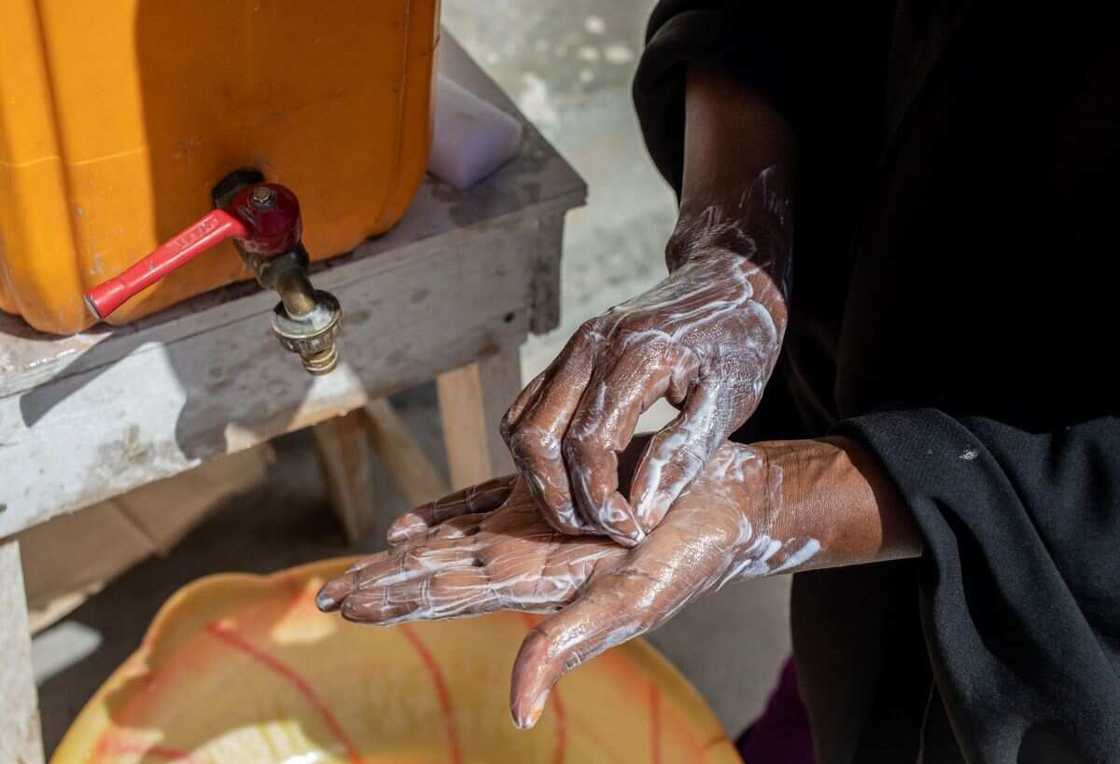3 Out of 5 Nigerians Lack Basic Handwashing Facilities To Fight COVID-19, Says UNICEF
- Government of Nigeria at all levels have been urged commit t providing efficient handwashing facilities for household and children in schools
- The call was made on Friday, October 15, by UNICEF in commemoration of the 2021 Global Handwashing day
- UNICEF said that 9 out of 10 schools across Nigeria lack facilities children need to wash their hands
PAY ATTENTION: Click “See First” under the “Following” tab to see Legit.ng News on your Facebook News Feed!
As the world celebrates Global Handwashing, the United Nations Children's Fund (UNICEF) has said that three out of five Nigerians lack basic handwashing facilities in their home to aid in the fight against COVID-19 and other infectious diseases.
In a statement shared by the Anike Alli-Hakeem, a UNICEF communication officer, while handwashing with soap is critical for fighting off infectious diseases, only 16 per cent of the Nigerian population have access to basic handwashing facilities at home.

Source: Facebook
Ali-Hakeem said this leaves families and communities at risk of many infectious diseases, with children particularly vulnerable.
He also said that around 3 in 10 people - or 2.3 billion globally do not have handwashing facilities with available water and soap in their homes.
PAY ATTENTION: Subscribe to Digital Talk newsletter to receive must-know business stories and succeed BIG!
Ali-Hakeem said the situation is even worst in the least developed countries, with over 6 in 10 people without access to basic hand hygiene.
Speaking on the challenge, UNICEF's Water, Sanitation and Hygiene (WASH) director, Ann Taylor, said that the global response to the COVID-19 has put out an unprecedented time for hand hygiene.
Taylor said:
"Yet progress remains far too slow for the most vulnerable, underserved communities."
According to her, sanitation and hygiene cannot be viewed as a temporary provision to manage COVID-19 as there is a need for a long-term investment in the provision of water, sanitation and hygiene facilities for all.
She said this in turn can help prevent the next health crisis from ravaging the vulnerable ones among the population.
She said:
"It also means fewer people falling ill with respiratory infections, fewer children dying from diarrheal diseases, and more pregnant mothers and newborns protected from preventable conditions like sepsis.”
UNICEF said that the latest available data show that some progress has been achieved since 2015 as the global population with access to basic hand hygiene at home has increased from 5 billion to 5.5 billion, or from 67 per cent to 71 per cent.
The agency however warned that should the current trend persist, 1.9 billion people will still not have access to basic hand hygiene by the end of the decade.
In Nigeria, 21 per cent of Nigerians had access to basic handwashing facilities at home in 2018, compared to 16 per cent in 2019, indicating a worrying downward trend.
In addition, 4 in 10 schools worldwide do not have basic hygiene services with water and soap, affecting 818 million students, of which 462 million attend schools with no facility at all.
In Nigeria, 9 out of 10 schools have no place for children to wash their hands while 1 in 3 healthcare facilities worldwide does not have hand hygiene facilities at points of care where the patient, healthcare worker, and treatment involve contact with the patient. In Nigeria, this figure is 4 in 5 healthcare facilities.
Reacting to this, Rushnan Murtaza, UNICEF Nigeria's deputy representative said the downward trend in access to hand hygiene services in the country is very worrying.
According to Murtaza, the life-saving act of handwashing protects everyone from infectious diseases like COVID-19 and cholera.
He further called on all governments to commit to providing hand hygiene, not as a temporary response to the pandemic, but as an investment in public health and economic resilience.
According to the statement, a new joint UNICEF and WHO report have identified five accelerators that can enable governments to rapidly scale up access to hand hygiene.
These accelerators include; good governance, smart public finance, capacity building, consistent data, and innovation.
Meanwhile, Legit.ng previously reported that children in Anuli community school Ezinifite, Aguata local government area of Anambra state had devised means to ensure they maintain good sanitation and hygiene.
The students led by their colleague, Ozioma Okafor, have bagged the title-ship of WASH Ambassadors, bridging the gaps in school hygiene.
According to the school children, their push for a hygienic environment follows the continued enlightenment on personal hygiene, availability of potable water and sanitation by various experts.
They also said they take the water, sanitation and hygiene gospel to the homes and playground where they enlighten their parents, siblings and friends who are not their schoolmates.
Source: Legit.ng


